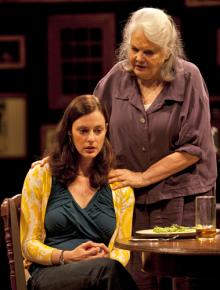Revolutionary in the family
reviews a play about a family and its political beliefs.
DO THE ends justify the means? Is there room for individual suffering under Marxism? Does the left have secrets? Is it possible to apply our ideals to real life in a practical way?
These are just a few of the questions raised in the new play After the Revolution by Amy Herzog. The play tells the story of an idealistic young Marxist whose world is torn apart when a family secret is revealed which causes her to question her beliefs and re-evaluate her personal relationships.
The story begins as the protagonist, Emma Joseph, celebrates her graduation from Law School with her parents and uncle. As the scene unfolds, we see what kind of woman Emma is. She talks passionately about her involvement in the movement to free political prisoner Mumia Abu-Jamal, and about her plans to start a fund to support that cause.
Growing up in a family of Marxists, Emma is very supported and encouraged to pursue her dreams of activism and changing the world. Beaming as a ray of light on her dream is the legacy of Emma's grandfather, Joe Joseph. All her life, Emma was taught to believe that her grandfather was a principled and flawless organizer for the Communist Party, as well as a martyr. He is a hero to her and the family, and she models her life after his.

The close bond that Emma shares with her father is abruptly destroyed when it is revealed to her that her grandfather was a spy for Stalin's Russia and a traitor to the U.S. Emma feels further betrayed when she discovers that her family knew about it and kept it hidden from her whole life.
What follows is a personal journey of self-discovery, as Emma confronts truths about the relationship between her and her father, her father and her sister, her mother and father. Importantly, she confronts the notion of idealism, and the sometimes unpleasant reality of life contradicting our ideals.
The story addresses the limits of political ideals when it comes to applying them to day-to-day life. For example, Ben Joseph, Emma's father, is depicted as a man who spent his life trying to raise a family with ideals of Marxism, while often failing the people who needed him most.
When it came to standing up for his own wife when she did something his comrades didn't agree with, he was silent. When his non-Marxist daughter, Emma's sister, was going through a hard time and needed his help, he distanced himself from her and let her fend for herself.
What makes this play so strong is the way that it weaves together politics, history, family relationships and a personal journey together so effortlessly. There are funny moments, heart-wrenching moments and everything in between.
It is a pleasure to see and hear the plight of Mumia Abu-Jamal presented on a professional stage, as well as to see a play about Marxists presented to a broad audience.


